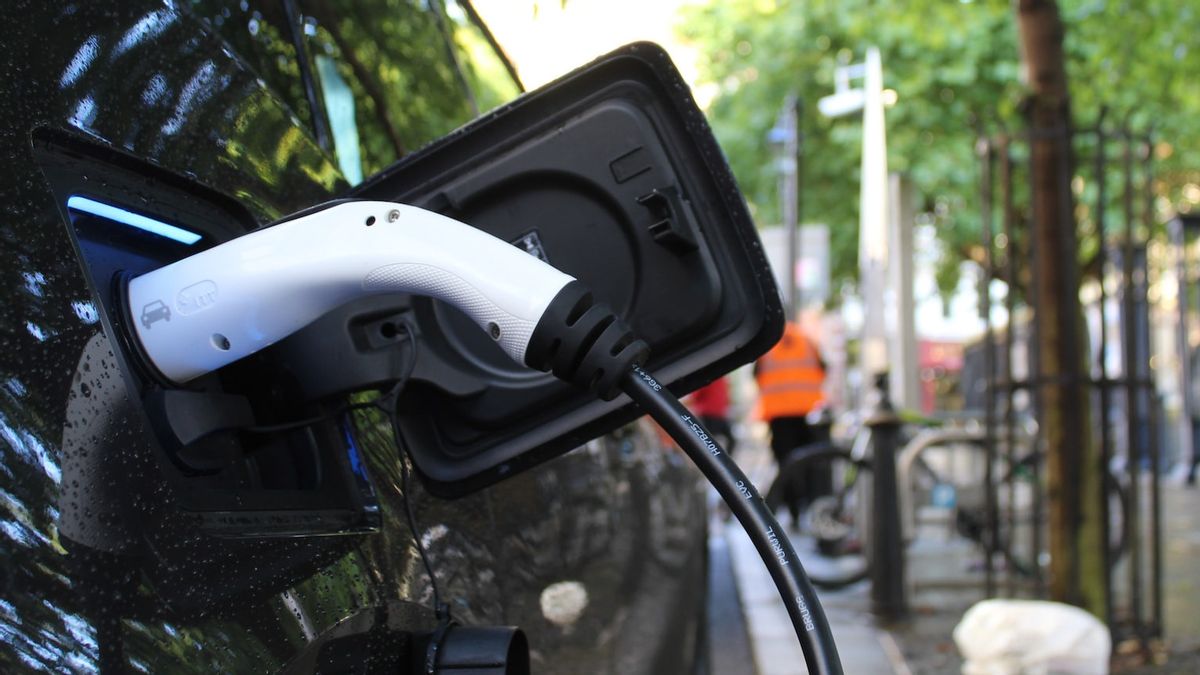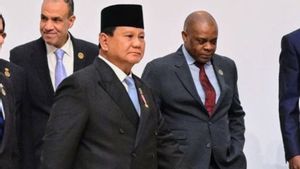JAKARTA - The DPR encourages to increase the transfer program from vehicles using high-emissioned fuel oil (BBM) to electric vehicles. The use of environmentally friendly vehicles in the future is one of the solutions to deal with excess pollution which causes air quality to worsen.
"Air quality is very essential for our health, so it cannot be taken lightly. There must be a commitment from the state to improve air quality for the future of our next generation," said Member of Commission VII DPR, Abdul Kadir Karding, Wednesday, May 31.
Based on IQAir reports, for the past few days the air quality in Jakarta has not been healthy and is considered to be the cause of rampant children affected by disease. Reportedly, the level of air pollution in Jakarta as of May 30, 2023 is at point 161, which shows unhealthy air quality.
In addition, IQAir stated that the concentration of PM 2.5 pollutants in Jakarta reached 74.4 mag/m3. This number is 14.9 times above the World Health Organization (WHO) guide threshold.
From the same report, Indonesia's average PM2.5 rate in 2022 will reach 30.4 g/m3 which means six times greater than the limit set by WHO. Karding reminded that increased air pollution has an effect on human health.
"Indeed, the impact of this air pollution is not immediately felt in a day or two directly, but can trigger disease in the community. So there must be improvements made in order to create good air quality," he said.
One way to suppress poor air quality is to reduce emissions from motorized vehicles. For this reason, the DPR RI supports the Government's efforts to socialize the use of environmentally friendly vehicles, namely electric-based vehicles, to the public through various programs.
The movement to use non-fosil fuel must be the main focus in order to reduce the level of carbon emissions in the air. So the culture of using non-fossil or electric or gas vehicles must be encouraged," said Karding.
The impact of using electric vehicles on air quality is known to be quite significant. Because emissions produced by internal combustion engine vehicles, such as carbon monoxide (CO), nitrogen oxide (NOx), and dangerous particles, can cause severe air pollution.
Karding encouraged the Government to increase the transfer program to electric vehicles. However, efforts to encourage the energy transition to New Energy and Renewable Energy, according to him, cannot be just by providing subsidies for motorbikes and electric cars because it will be less than optimal.
Karding assessed that there must be additional efforts from the subsidy of electric vehicles so that the results of the development of new and renewable energy (EBT) can be sustainable and the benefits can be felt by all people.
"If electric vehicles become popular and widely adopted, a positive impact on air quality will be even more pronounced," he said.
To note, currently the Government has a subsidy program for buyers of electric motorcycles and conversion electric motors with a direct discount of IDR 7 million. Meanwhile, subsidies for electric cars are in the form of tax deductions from the previous 11 percent to only 1 percent.
Karding encourages the Government to increase programs or policies related to the transition to electric vehicles. He also asked the Government to prepare complete infrastructure for the use of electric vehicles.
"The government needs to develop a sustainable strategy and consider long-term needs in providing incentives for electric vehicles," explained Karding.
"Including the development of the completeness of supporting facilities and infrastructure so that when people switch to electric vehicles, it is also guaranteed to provide supporting facilities for the use of their vehicles," he added.
Regarding the use of electric vehicles, the DPR has set a direct example during the 8th G20 Parliamentary Speakers' Summit (P20) on October 5-7, 2022. P20 is a parliamentary forum for G20 countries held in a series of G20 Summits.
In the P20 session, the DPR used electric cars as vehicles for delegates from G20 countries and other invited guests.
Karding said the use of electric vehicles is an implementation of one of the renewable energies that is environmentally friendly and can reduce greenhouse gas emissions, as targeted by Sustainable Development Goals or SDGs or Sustainable Development Goals.
"The DPR RI is ready to be at the forefront of reducing emissions. We are also ready to support climate change impact reduction programs and global warming through renewable energy," said Karding.
The DPR is also confirmed to continue to be committed to assisting the realization of Indonesia's target of reducing carbon emissions to maintain a global temperature increase by increasing the target of Enhanced Nationally Determined Contribution (E-NDC) to 32% or equivalent to 912 million tons of CO2 by 2030.
One of them is through the Draft Law on New Energy and Renewable Energy (EBT) which can be a long-term solution in the problem of climate change. Karding hopes that this regulation will accelerate the use of the new and renewable energy mix in the country.
The EBT Bill is a commitment to carry out the energy transition because it contains the preparation of renewable energy in Indonesia. We hope that the EBT Bill can be ratified soon because it will be a strong basis for Indonesia in utilizing its EBT potential," he explained.
Therefore, Karding asked for the Government's commitment to complete the discussion of the EBT Bill. He ensured that Commission VII of the DPR RI, one of whose duties in charge of energy affairs, was ready to cooperate with the Government, especially since the EBT Bill was included in the National Legislation Program (Prolegnas) and was an initiative of the DPR.
"This regulation is important to become a legal umbrella or regulation regarding reducing the use of fuel that causes carbon emissions," said Karding.
Regarding emission reduction, the Indonesian House of Representatives itself has also started to clean up. For example, by building a Solar Power Plant (PLTS) to meet the need for additional electricity in the people's representative building.
The use of solar panels in the parliament complex is the council's commitment to efforts to save the earth from the threat of climate change. The solar panels on the PLTS are installed at the Parliament Complex, Senayan, Jakarta, precisely in the DPR's Energy Park in front of the Nusantara Building or the Kura-kura Building, by carrying the concept of a green building.
The PLTS built in Taman Energi can meet 25% of electricity needs in the DPR building. Karding said the DPR also has policies that are environmentally friendly or environmentally friendly.
"Among them is the reduction in the use of plastic and paperless efforts in every scope of council work," explained the legislator from the Central Java VI electoral district.
Through environmentally friendly programs, the DPR hopes to set an example for the community in the use of EBT.
There must be real action in the realization of low-carbon renewable energy. Of course this is a shared responsibility, including us in the DPR, so that our next generation will have a healthy place to live," concluded Karding.
The English, Chinese, Japanese, Arabic, and French versions are automatically generated by the AI. So there may still be inaccuracies in translating, please always see Indonesian as our main language. (system supported by DigitalSiber.id)









